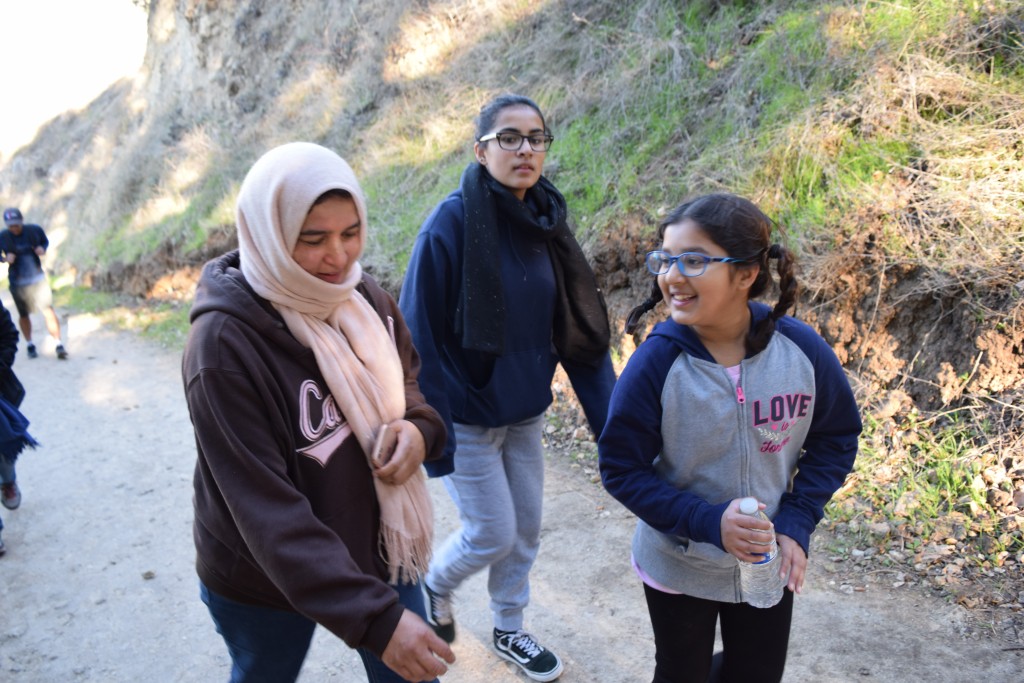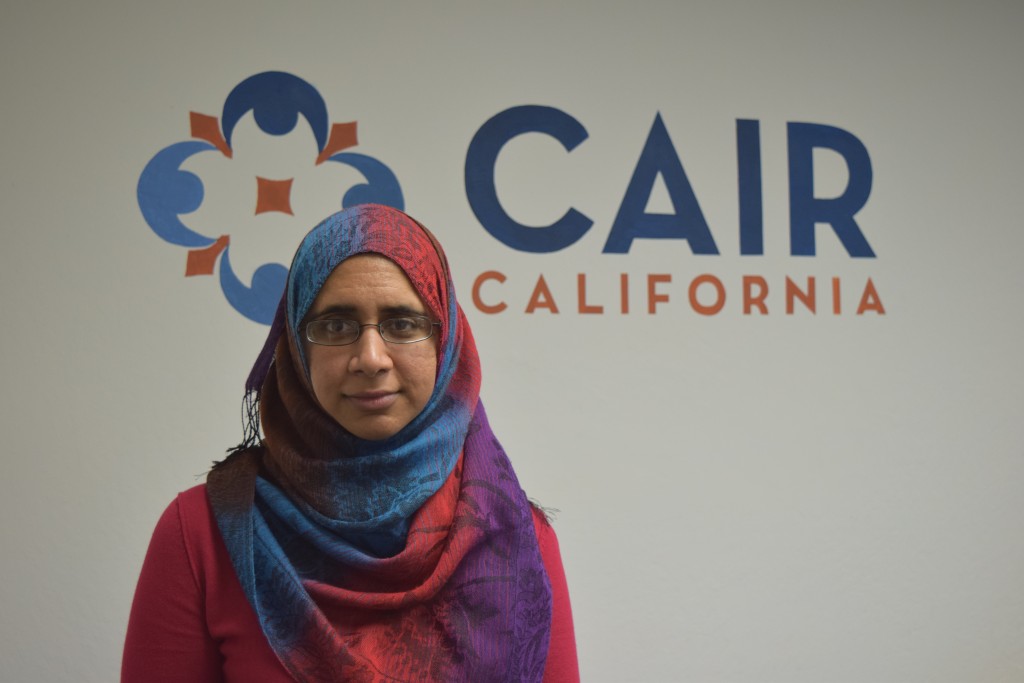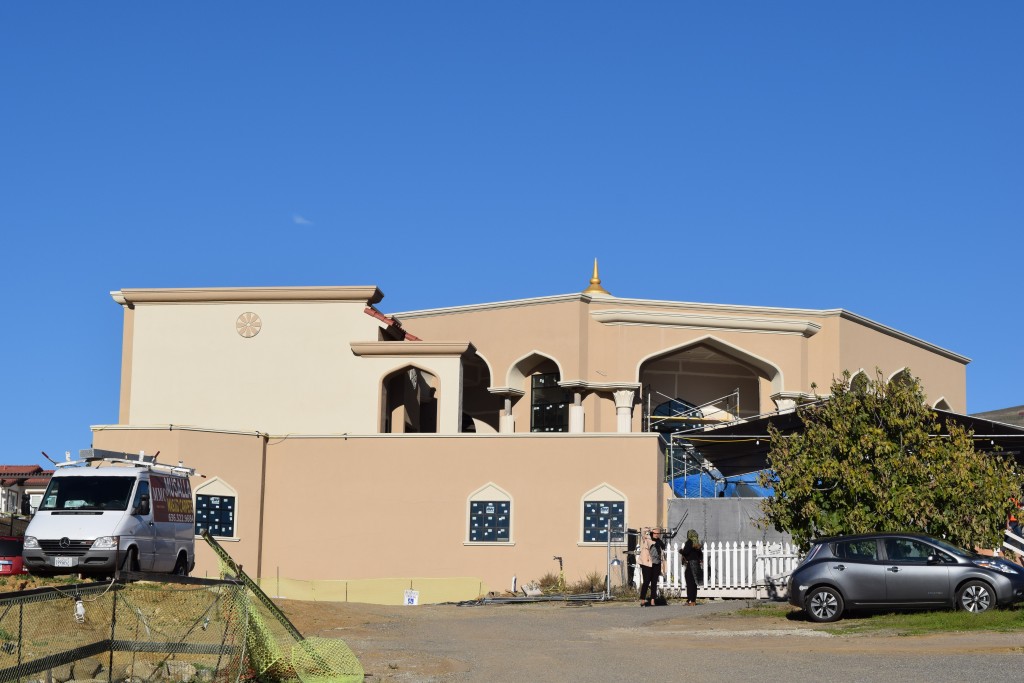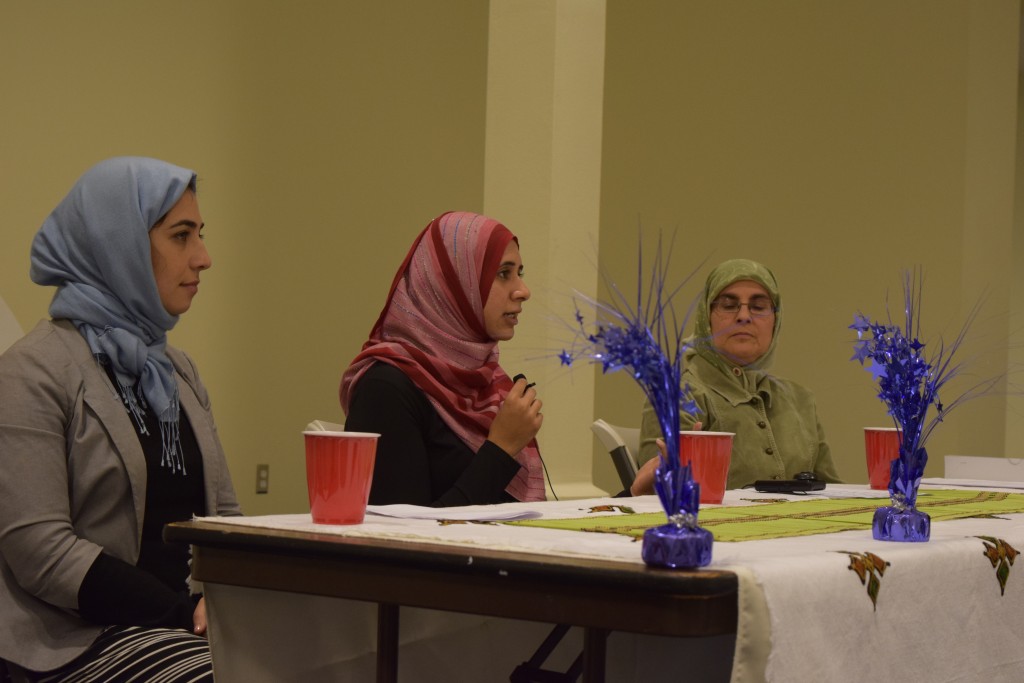Earlier this month at daybreak, Kristen Krauss, a teacher from San Jose, put on a headscarf for the first time and walked beside Saima Saleem, a mother of three from Santa Clara, who has worn one for most of her life. Joined by about 70 other hijab-wearing hikers, the group trekked towards Mission Peak, past rolling green hills dotted with cows as the city of Fremont began to appear below them.
Krauss organized the Dec. 3 “Hijab Hike” via Facebook after reading reports of a woman with lupus who went for a hike near Mission Peak wearing a headscarf and returned to find her car window smashed and a hate note left on her windshield by someone who thought she was Muslim.

“That really concerned some of us,” Krauss said. “We wanted to reclaim this place, Mission Peak, and public places in general as places that can be safe for all people and for women that choose to cover their heads.”
President-elect Donald Trump’s proposals to institute a Muslim registry and to ban all Muslims from entering the United States have left many Muslim-Americans feeling unwelcome in their own country. Although Trump’s proposals may or may not become actual policy, the rhetoric of his campaign has served as the impetus for dozens of reported acts of hate against Muslims.
“People are scared,” said Saleem, who is Muslim. “They are worried about what is going to happen in the future; are we safe here or not? I have fear too about what is going to happen with our children.”

In the Bay Area since the election, a woman wearing a hijab, a symbol of modesty worn by Muslim women, was threatened by a group of men at UC Berkeley, a student at San Jose State had her hijab pulled off in a parking garage and a San Jose mosque received a virulent hate letter that said Trump would do to Muslims “what Hitler did to the Jews.”
The Southern Poverty Law Center counted 51 reported acts of anti-Muslim hate and harassment across the nation in the week following the election, stating that many incidents involved direct references to Donald Trump. Zahra Billoo, executive director of the Council on American-Islamic Relations Bay Area chapter, said that even more crimes against Muslims have occurred and gone unreported.
But alongside the threats and attacks, there has also been an outpouring of support from Bay Area residents that has heartened the local Muslim community. Billoo said that since the election, her office has been flooded with calls from allies asking what they can do to support the Muslim community.
“In some ways we live in dark times,” Billoo said. “But in other ways there is a silver lining to what is going on and it is that people who were taking for granted our civil rights, or the progressive region we live in, know now that they must take action to protect each other.”
The Evergreen Islamic Center
In response to the hate letter that San Jose’s Evergreen Islamic Center received on Nov. 23, nearly 75 community members, including multiple leaders of other faiths, showed up at the mosque’s weekly prayer service on Dec. 2 holding signs with encouraging messages like, “I stand with my Muslim neighbors” and “we’re better together.”

Bridget Harrison, a physician who works in San Jose, organized the demonstration after reading about the letter which called Muslims “vile and filthy people” and told them to “get out.”
“I was very disturbed to hear those messages of hate,” Harrison said. “I wanted to put something together to show support and solidarity both for the members of the Islamic Center here and also for the community to give folks an opportunity to come together and show what we are really about.”
Faisal Yazadi, president of the Islamic center’s board of directors, said the mosque, which attracts between 200 and 300 patrons every week, had never been the target of hate before. At first, leaders were unsure about how to respond to the letter and kept it for a day before notifying police.
“Initially, we were all in a state of shock because the content of the letter was so graphic, it took us some time to process,” Yazadi said.
Once the letter became public, Yazadi said the response from the community was “overwhelming.”
“Everybody and their brother has been calling us, stopping by the center, dropping off flowers, writing e-mails. All kinds of positive messages have been coming from the entire country,” he said. “That just goes to show how much goodness is out there.”
The risks of wearing a hijab
Even though Bay Area residents have a reputation for being tolerant of religious differences, many Muslim women struggle with the decision to wear a hijab for fear of being singled out or attacked.
At an event titled “Moving forward after the election” hosted by the Council on American-Islamic Relations on Dec. 2 at the Berkeley Masjid, or mosque, Muslim community members came forward to express their concerns and ask questions to a panel of speakers, which included executive director Billoo, Ameena Jandali of Islamic Networks Group and Elica Vafaie of the Asian Law Caucus.

One young boy asked, “If people bully women who have hijabs, how do you stop that?” The panel recommended telling the bully to stop and yell for help while avoiding a physical confrontation at all costs.
Another man asked about self-defense options, launching a conversation about carrying pepper spray or other weapons and taking self-defense classes.
Khalida DuBose, a patron at the Berkeley Masjid and a co-organizer of the event, said that when she was a high school student after 9/11, she experienced backlash from teachers and students because of her head covering.
“Kids thought it was an open invitation to harass me.” she said. “I would get on the school bus and they would pull my hijab off; it was kind of traumatizing.”
DuBose fears that Trump’s campaign has unleashed a similar wave of Islamophobia. “I think it has opened the doors or a window to people thinking it’s ok to say whatever they want.”
For a period after college, DuBose removed her hijab because she felt like it was hurting her job prospects. She has since made the decision to put it back on.
“I felt like I was missing part of my identity.” she said. “I really feel sad when other Muslim women come to me and say I really want to wear it but I can’t, I feel scared to.”
Fifteen-year old Tooba Saleem, who attended the “Hijab Hike” in Fremont, has chosen not to wear a hijab.
“I took it off because I felt like there was a lot of people staring and I felt uncomfortable,” Saleem said. She also said that Trump’s election has contributed to the climate of fear, noting that one of her friends at school used to wear a hijab, but since Trump was elected, her mother let her take it off.
Correcting misunderstandings
Certain religious practices, like wearing a hijab, can be sources of misunderstanding for non-Muslims.
To help bridge the gap of ignorance between Muslims and other community members, the Islamic Circle of North America’s Bay Area chapter hosted “Lunch with a Muslim” on Dec. 3.
Participants listened to a talk on fundamental Islamic beliefs, followed by a question and answer session and a shared meal.
“There are about a quarter-million Muslims in the Bay Area,” said Ameen Ashraf a board member of the group that organized the lunch. “We are your neighbors, we are your class fellows, we are your co-workers, we are sometimes buying stuff from you, we are selling stuff to the rest of the community. So let’s know about each other more.”
Jim Matthews came all the way to San Jose from San Francisco to attend the event. “What can I do to reach out to my local community to make sure they realize that one, I am there to support them, and two, that they are not being isolated?” he asked, followed by a round of applause from the group of about 40 people.
“We do get some not-so-welcome comments sometimes,” said Ashraf, referring to similar events the group has hosted in the past. “But at the same time, overwhelmingly the response has been that people feel that they learned something new, that they get to interact with someone that they always thought of as the other, and now they can relate more with them.”
“The people-to-people interaction is one thing that is unmatched.” Ashraf said. “You can hear about something, but once you get to meet that person, it’s a different thing.”
